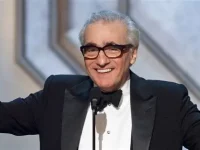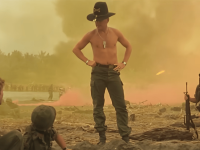Cannes Film Review: ‘Loving’

WHITE TRASH. Powerful, understated performances from Joel Edgerton and Ruth Negga carry director Jeff Nichols’ oh-so-sensitive portrait of a mixed-race marriage forbidden in 1958 Virginia.
“The Crime of Being Married.” So read the headline that accompanied photos of Richard Loving, a Southern “white trash” construction worker, and his African-American wife Mildred in the pages of Life magazine. One day — maybe today — audiences will sit down to watch Jeff Nichols’ nobly hatred-proof period romance, “Loving,” which goes nearly the entire first reel before explaining that mixed-race marriages were illegal in the then-segregated Virginia of 1958, and they’ll be surprised to learn what the crime in question was, having already observed and accepted the on-screen couple without the blinders of racial prejudice.
It is from this position of relative enlightenment that Nichols approaches the true story of “the Loving couple,” a film of utmost sensitivity, but not nearly enough outrage, secure in its position vis-à-vis the bigotry that dominated before America’s Civil Rights revolution. Like the plaintiffs in the Supreme Court case that identified marriage as an inherent human right, “Loving” is a humble, soft-spoken film, in which no one so much as raises his voice or weeps in the face of undeniable injustice. Though it will inevitably factor heavily in year-end Oscar conversations, Nichols’ film is seemingly less interested in its own glory than in representing what’s right, and though it features two of the best American performances of the past several years, from Joel Edgerton and Ruth Negga (neither of whom are American, hailing from Australia and Ethiopia, respectively), its emotional impact derives precisely from how understated they are.
Premiering in Cannes a mere three months after Nichols’ “Midnight Special” screened in competition at the Berlin Film Festival, “Loving” shares more than just Edgerton and the director’s career-long leading man, Michael Shannon (here relegated to a small supporting role as Life photographer Grey Villet), in common with the retro-styled genre movie. In a sense, both play on the notion that humans fear what they don’t understand — and how otherwise innocent people can be forced into a position of living outside the law when society has not yet wrapped its head around their differences. While far from the suspenseful genre-movie tone of “Midnight Special,” “Loving” finds Edgerton’s character living in a state of perpetual fear, fear that he and his wife Mildred could be arrested at any time — or worse, though the film never actually dramatizes the very-real threat of hate-crime violence.
In the half-dozen years since his breakthrough performance in Ozzie crime-family opus “Animal Kingdom,” Edgerton has demonstrated nothing short of full actorly commitment to a series of demanding roles. Until now, what he has never seemed capable of doing is fully relaxing into the skin of another character, and yet, under Nichols’ direction, he disappears into the role of Richard Loving. Behind the tobacco-stained false teeth, the “Sling Blade”-like underbite, the furrowed brow and close-cropped straw hair lives and breathes a simple man whose inner happiness derives from having found his soul mate. Maybe he should have known better, as his mother implies, than to marry a “colored” woman, but there’s no sign that her race plays any part in or obstacle to Richard’s connection to Mildred, whom Negga embodies with a quiet dignity and deep inner strength. (The fact that Mildred is herself part-white raises other unspoken questions about the legitimacy of an anti-miscegenation law.)
Without ever having to “prove” it, these two are clearly very much in love. That alone would make a fine movie, as so many have (“Away We Go” and “Infinitely Polar Bear” come to mind as two solid recent examples, in which almost no mention is made of the fact that its central couples hail from different races). But “Loving” isn’t about loving at all. It’s about the fact that certain kinds of loving were deemed illegal in America’s relatively recent past, and it’s about the way that a handful of eager civil-rights lawyers took their case to the highest court in the land, paving the way for arguments still being waged today — as in the recent overhaul of the Defense of Marriage Act and country-wide legalization of same-sex unions.
Tapping into the same sensitivity Heath Ledger (another Ozzie) brought to “Brokeback Mountain,” Edgerton’s performance captures a side of American masculinity seldom shown on-screen — namely, a certain personal conviction divorced of words that falls silent in the face of conflict and can appear calloused to those who don’t know how to read the body language. Edgerton invites us into that intimate space. In his modesty, Richard may never meet another character’s gaze, and yet Nichols and d.p. Adam Stone (who has shot every one of the director’s five features) find a way to peer into the character’s eyes — and into his soul.
In June 1958, after proposing to Mildred on the acre of rural Virginia country where he plans to build their house, Richard drives his bride-to-be to Washington, D.C., where they elope. But trouble awaits back home, and someone talks to the authorities (true to the film’s policy of telling this story without clear villains, we never learn who the traitor was). Late one night, the local sheriff (Martin Csokas) and his men turn up, knock down the bedroom door and drag the couple to jail — an indignity carried out with any nefarious sneering, but depicted as just part of the job. The Lovings were clearly in violation of Virginia law at the time, and despite their prejudices, both sheriff Brooks and judge Bazile (David Jensen) held attitudes consistent with their communities.
Richard hires a lawyer (Bill Camp, oozing flop sweat), but has no choice but to accept the penalty: leave Virginia and don’t come back with Mildred for 25 years, or face one year’s prison time. Behind their doleful Basset Hound expressions, Richard and Mildred both look sad, but never come out and say as much. Nor do they seem especially angry. At one point, Mildred’s sister (Terri Abney) accuses Richard of causing unnecessary grief to their family, but by and large, this patiently paced, mild-mannered movie unfolds within an extremely narrow emotional range. Nichols even steers clear of the inevitable tensions the Lovings’ situation must have caused within their marriage: They never argue, and even a near-death experience barely seems to upset them.
It’s as if the Lovings consider themselves too small in the grand scheme of things to fight the system, and it’s only after ACLU lawyer Bernie Cohen (comedian Nick Kroll, playing the inexperienced character’s insecurity, rather than his sincerity) calls that they agree to go to court, posing for newsreel interviews and Villet’s camera. “Loving” is so committed to this spirit of low-key respectability — subtly reinforced by David Wingo’s understated string score — that it very nearly skips over the Supreme Court trial, featuring just a few remarks by Cohen and fellow counsel Phil Hirschkop (Jon Bass, as superficial as Kroll) before delivering the verdict by telephone. Mildred answers slowly, as if calls were somehow commonplace in the old farmhouse where Richard has only just installed a phone, and she barely reacts to the news. Such humility may be devastating, but it ain’t dramatic, and though we’ve been waiting for this moment the entire movie, the scene underscores “Loving’s” single greatest weakness: It’s too damn polite. Had the same story been told by parties who’d suffered through the same oppression, one doubts they could have played it so cool — nor would they have been quite so convinced the problem ended in 1967.
Cannes Film Review: ‘Loving’
Reviewed at Cannes Film Festival (competing), May 16, 2016. Running time: 123 MIN.
Production
A Focus Features release and presentation of a Raindog Films, Big Beach production, in association with August Films, Tri-State Pictures. (International sales: Insiders, Los Angeles.) Produced by Ged Doherty, Colin Firth, Nancy Buirski, Sarah Green, Marc Turteltaub, Peter Saraf. Executive producers, Brian Kavanaugh-Jones, Jack Turner, Jared Ian Goldman. Co-producer, Will Greenfield.
Crew
Directed, written by Jeff Nichols, based in part on the documentary “The Loving Story” by Nancy Buirski. Camera (color, widescreen), Adam Stone; editor, Julie Monroe; music, David Wingo; production designer, Chad Keith; art director, Jonathan Guggenheim; set decorator, Adam Willis; costume designer, Erin Benach; sound, Pud Cusack; supervising sound editor, Will Files; re-recording mixers, Files, Brandon Proctor; visual effects supervisor, Phil Crowe; visual effects producer, Chris Harlowe; visual effects, The Mill; special effects supervisor, Gary Pilkinton; assistant director, Cas Donovan; casting, Francine Maisler.
With
Joel Edgerton, Ruth Negga, Marton Csokas, Nick Kroll, Terri Abney, Alano Miller, Jon Bass, Michael Shannon.










